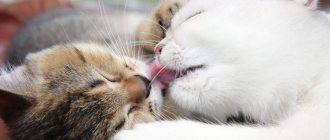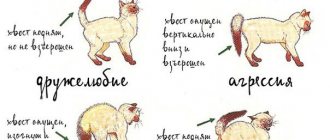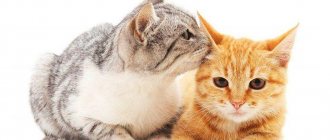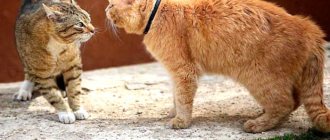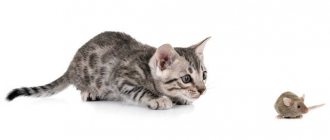With the appearance of a cat in the house, the owners immediately have a lot of pleasant and not so pleasant troubles. Many owners complain that their pets are excessively talkative, which is impossible to cope with. In fact, no pet will scream, meow, or otherwise vocalize constantly. Finding the reason and weaning the cat from yelling becomes the primary task for the owner.
Can cats meow constantly for no reason?
Meowing for no reason is impossible. The cat's meow is a verbal, that is, vocal, method of communication. Our pets use it in only 2 cases: for communication and to attract attention. In the first case, they just talk, and in the second, they try to explain what exactly is bothering them.
Thus, there is always a reason, and, in addition to banal boredom due to attention deficit, it may be a life-threatening pathology.
Latest Chinese warning
It is possible that you are busy and cannot devote much time to your pet. At least as much as he needs. He may choose this method (by the way, not the most outrageous one) to remind you of your responsibilities: playing together, talking, ironing the back and scratching behind the ear.
As you can see, there is no paradox or mythical cat harmfulness in the “closed door syndrome”!
Subscribe to our channel and learn more interesting and useful things about cats!
Why does a cat constantly meow for no apparent reason?
“Meows for no apparent reason” is a more correct formulation. You may not actually be able to see the real source of the problem, so try to find it first. Associated symptoms, including behavioral changes, will help you with this.
Physiological desires
Non-dangerous explanations include physiological desires. This includes:
- Hunger and thirst. Cats use the loudest and most demanding “meow” when asking for food. It is with its help that they wake up their owners early in the morning and beg for treats or supplements. They may also not like the freshness of the water, which means it’s time to update it.
- Instinct of reproduction. Features of manifestation depend on gender. Cats actively mark their territory, and cats roll around on the floor and freeze in a characteristic pose. They have only one thing in common: during sexual hunting, both of them cry heart-rendingly, inviting a partner for mating.
- Desire to defecate. If the screams are accompanied by jumping, then the pet is simply preparing to go to the toilet. Your help will only be needed when the “meow” is a request to change the filler.
In all of these situations, only anxiety and increased activity are acceptable. The general condition of the animal must remain satisfactory.
To attract attention
A request to change the filler and water is also attracting attention, but this section is about something a little different. Sometimes a pet is completely satisfied from a physiological point of view, but still continues to scream, pursuing the following goals:
- Request for help. Kittens often call for help if they cannot get off a high surface or get stuck behind a cabinet. Also, mustachioed pets love to be hysterical so that the door will be opened for them. And it doesn’t matter that in a minute they will have to go through it again.
- Communication. A small amount of games, petting and talking is unacceptable for contact animals. With their voice they ask to be held or called to play.
Separately, it is worth noting the manipulations. With a plaintive “meow,” a cunning pet can beg for a piece of your dinner or the right to sleep on the kitchen table.
Pain, discomfort
If a meowing cat looks painful, examine it. Check your stomach first. Most often, meowing is associated with stomach pain, but in addition to it, there are other causes of discomfort:
- Diseases of the urinary system. KSD and cystitis increase the vulnerability of the mucous membrane. In severe cases, blood appears in the urine.
- Gastrointestinal diseases. In addition to the stomach, pain syndrome can also affect the intestines. In both cases, symptoms include bowel movements and vomiting.
- Helminthiases. The activity of helminths causes severe intoxication, therefore, as with gastrointestinal diseases, diarrhea and nausea are noted. With severe damage, it is possible to detect eggs and the parasites themselves in the feces or in the anus area.
- Tumors. Cause pain due to pressure on nerve endings. May be accompanied by weight loss, severe apathy and sleep disturbances.
- Injuries. Not all damage is visible to the naked eye. Some injuries can only be detected with an x-ray.
- Flea or tick infestation. Accompanied by severe itching and hair loss. Some types of parasites are also dangerous to humans.
- Viral and bacterial infections. Most infectious lesions are characterized by high fever, loss of appetite, severe lethargy and hoarseness of the voice.
- Consequences of sterilization or castration. The only non-dangerous situation caused by unpleasant recovery from anesthesia. Complications are possible here, but with proper care of the operated patient they occur very rarely.
Cats are very patient. They are able to suppress any unpleasant sensations for quite a long time. If your pet is screaming in pain, do not hesitate to diagnose, as the discomfort he is experiencing has reached its limit.
Irritation, stress, fear
Another reason is an unpleasant situation. The animal may react to it in the following ways:
- Irritation. Cats get annoyed when they are petted against their will. In response to unsolicited affection, they may meow aggressively, slash with their claws, or cling to your hand.
- Stress. Moving, having a new family member, traveling on public transport and other situations that differ from the usual way of life require getting used to. The animal will worry and scream until it feels safe.
- Fright. Many mustachioed pets do not like thunderstorms, fireworks, loud screams and the noise of a vacuum cleaner. When the source of anxiety disappears, they calm down and become silent.
Prolonged and too frequent stay in a tense state is fraught with a nervous breakdown. To avoid mental problems, the animal needs to demonstrate the safety of the threat or try to eliminate it.
Psychological diseases
Old pets, like their owners, are not protected from Alzheimer's disease. A plaintive “meow” at night may be associated with disorientation in space due to memory problems.
Imminent birth or false pregnancy
During a close birth, the animal feels vulnerable and uncomfortable. Young mothers awaiting the birth of their first kittens feel especially nervous. Similar feelings arise during false pregnancy.
Territory defense
An angry meow in a raised voice, reminiscent of a scream, is a sign of aggression. With its help, the animal protects its territory from invaders. Similar behavior is observed when keeping several mustachioed pets at the same time or when moving to a new place where there are no cat odors yet.
Communication with man and fellow humans
The most talkative breeds are Orientals. They constantly communicate with their owners, coming up with more and more new “meow” sounds for different occasions.
Animals also talk to each other, but meowing is most often used by mother cats communicating with kittens, as well as those who defend their territory. Adult and friendly pets are more prone to purring.
Will sterilization help?
As we wrote in the first paragraph, cats mark their territory by leaving their scent and marks. As many people know, if you sterilize an animal, it loses interest in the opposite sex. But sterilization will not help overcome the instinct to mark oneself with claws!
Yes, it is necessary to sterilize pets; this will protect them from many diseases and prolong their lives. You, in turn, will not need to listen to cat concerts or think about what to do with the offspring. How to stop a cat from scratching furniture and wallpaper? There are other productive methods.
What to do if your cat meows?
If your cat meows, find out what is bothering her. Depending on the situation, the problem can be solved with attention, education or treatment.
Find out the reason
First, make sure that your pet is not in danger. If he looks healthy, check the relevance of the physiological desires listed above. Very often the problem is solved by feeding, changing water or filler. When sexually hunting, you can simply wait or resort to castration, since taking hormonal drugs provides only a temporary solution to the problem and often leads to complications.
Give enough time, talk, caress
If the animal does not have enough attention, try to allocate more time for stroking and talking. Regardless of the situation, you need to communicate with your pet daily. Regularity is much more important than duration, but ideally both conditions should be met.
Treat your pet with special warmth when he is nervous or afraid. Your affection will give him a feeling of security, but it is better to avoid pity. Behave as usual so that the cat is convinced that there is no real threat from the irritating factor.
Parenting moments
Behavior correction is necessary for hyperactive animals and manipulative pets. If your cat lacks attention due to excess energy, buy him interactive toys and play with him more often before going to bed.
Manipulators will have to be dealt with using classic methods: ignoring or punishment. The same goes for those who are too talkative. If your cat's talkativeness tires you, make comments to him. To do this, use a strict intonation, but avoid shouting.
Remember that this method is effective only in certain situations (bedtime, your illness, severe stress after work). Too frequent tugging or ignoring can offend the mustachioed person and have a negative impact on his psyche.
When to visit a veterinarian
You should contact a veterinarian in 2 cases: if you have any alarming symptoms and if there is prolonged meowing that has no justification. Some pathologies, including psychological diseases, occur unnoticed in the early stages of their development. Because of this, a complete examination of the animal is required to make a diagnosis.
You may also need help from a veterinarian to suppress sexual desire and relieve stress. In the first case, you will have to resort to surgical intervention, and in the second, to taking sedatives.
How to stop a cat from scratching furniture using improvised means?
Fill the spray bottle with water. And as soon as your pet starts tearing up the sofa or other unauthorized place, sprinkle water on it! There will be no harm to either the cat or the furniture, but the pet will begin to associate its favorite activity with unpleasant phlegm!
If you are thinking about how to stop a kitten from scratching the sofa, then this method is unlikely to work. Usually, kids accidentally damage furniture while playing. They begin to climb the curtains, try to conquer the sofa, the carpet hanging on the wall - this is normal behavior. If you pour water on your kitten every time he plays, you will simply grow a nervous creature, apathetic to everything. The same applies to scaring sounds.
Meowing in small kittens
Kittens up to 2.5-3 months are highly dependent on their mother. With their meowing, they inform her about hunger, fear and lack of attention, that is, they do the same thing as adult animals. The only difference is that all the kids run to the cat for help, and not to the person. Because of this, immediately after moving, they experience extreme stress and do not immediately trust their new owner.
Conclusion
If a cat meows loudly, do not rush to draw conclusions and carefully study the situation. Do not forget that a number of symptoms require immediate contact with a veterinarian. Ignoring in the case of pathology is not only useless, but also dangerous, so always show a reaction. The only exception is manipulation. If they are the problem, your attention will only make the unwanted behavior worse.
Do you like the article? 245
Cases requiring contact with a veterinarian
If a cat constantly meows and itches, then he may have fleas, lice eaters, or other ectoparasites (living outside). Allergies and ear mites may also have such manifestations. It is necessary to show your pet to a doctor to determine the cause of this behavior and determine measures to help.
A hard, inflated belly speaks together with a loud meow, serious anxiety or, conversely, lethargy; increased appetite or its absence indicates a helminthic infestation.
In such cases, you should consult your veterinarian. He will prescribe an anthelmintic and tell you how long to give it.
If the kitten cries loudly and trembles at the same time, you can try to warm it or feed it. If the cause is not hunger and cold, then you need to see a doctor, as this may be damage to the spine.
Refusal to eat, diarrhea, or, conversely, cleanliness in the tray for a long time, accompanied by plaintive and constant meowing, is also a reason to seek medical help.
A caring owner always understands his pet. Cats have almost no means of expressing their complaints or wishes other than by making sound signals. It is important to understand what the pet wants to communicate and provide him with all possible assistance.
Demanding attention and affection
Although cats show individuality, sometimes they behave like royalty who do not care about others, they still need communication. In the house where he was born (except for exceptional cases when the baby is left without a mother immediately after birth), the kitten always has playmates. These are brothers and sisters and a mother cat who explains the rules of behavior to the baby and instills the necessary skills. Finding itself alone in new conditions, the kitten will seek the company of a person, ask to play with him or pet him.
Outdoor games with a kitten will not only ensure its normal physical and mental development. Having played enough and been properly tired, the kitten will stop wandering around at night and bothering its owners with screams.
Sticky surfaces
How to stop a cat from scratching the sofa? Just let it stick once or twice! Attach double-sided tape to the upholstery. As soon as the animal approaches to scratch its favorite place, it will immediately stick its paw or fur on its side. Cats hate being clingy, so you won't need a lot of lessons.
Place the tape in all places where the cat sticks its claws - the window sill, corners, doors, and so on. Soon the animal will avoid dangerous places three meters away!
How to avoid what is predicted in omens
The most important thing in communicating with cats is good intentions and care. You should not anger the cat, mock, or neglect the animal. If he feels unnecessary, then one way or another he will leave the life of a superstitious person, but he will also take everything that is his – protection, warmth and comfort.
Signs about cats are very peculiar in nature. They promise warmth and cold, additions to the family and illness. They treat everyone who is possible, but they also honestly indicate with whom things will be difficult. For a cat to protect the house, all he needs is to eat and feel loved.
